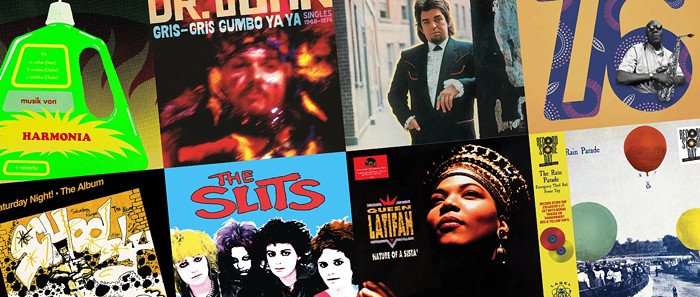There are some things you just know. Still, it may take three rescheduled phone interviews, god-awful cell reception, and finally, a lively conversation to prove you're right.
I'd never seen or even heard of the Sounds before they made their American television debut on Last Call with Carson Daly, and as I watched I knew the five-piece wasn't just another band trying to cash in on the '80s craze, despite its style. How did I know? Just by looking at her, I sensed frontwoman Maja Ivarsson's backbone. The Sounds were making a live debut and Maja, surrounded by her male bandmates, was wearing pants. That's how I knew.
Though they're certified platinum-selling rock stars in Sweden, all is not rosy for the Sounds. Even the Swedes, it would seem, are jaded. "The thing that makes me really, really mad," Maja emphatically says, "is that there are a bunch of journalists in Sweden who accuse us of being a product that the record company put together. They think, 'You look too good, your songs are too good, this can't be real.' And that makes me really mad because the record company didn't even believe in us from the beginning."
"That's why I wanted to talk to you," I say, in reference to knowing the Sounds are something unique. "Because I had to confirm that I was right." Her response surprises me: "Yeah, but I just want to say thank you so much. I will never forget this interview, because you are the first [journalist] who has asked me, 'Tell me what the story was, from the beginning to now.' Everyone else just asks about the present and about where we're going. No one has cared about anything that led up to this record."
The Sounds formed five years ago, and by 1999 Maja was already at loggerheads with an A&R guy. "We had a bunch of songs and we thought, 'Hey, this is hit music,'" she tells me after the band arrives at their Saint Louis tour stop. "And this record company guy heard 'Living in America,' the first song we ever wrote, and he liked it but wasn't convinced that our other songs were as good as that one. But I was. So we took the video we'd made ourselves [total production cost: $500] to ZTV--it's like MTV--and they started to broadcast it several times a day. So the A&R guy was like, 'Oh shit, maybe it is good.' I said, 'Yeah, I told you so.' I've been convinced since day one, but he needed to hear someone else say that we were good.
"We signed with the label, recorded Living in America [released in the U.S. in 2003], and a year later the A&R still wasn't convinced, so we released 'Hit Me!' as a single in Sweden, which did okay," she continues. "Then 'Living in America' was released, and boom! It all exploded, every kid bought it, and then the album came out and sold platinum. So now he's convinced that it's working out."
I ask Maja if the constant references to Blondie bother her. "I can understand that when it's a new band," she says, "people have to compare it to something to try to explain what it is. And they make it really easy for themselves by saying we're like Blondie. But I'm really flattered by that, although sometimes I get sad because I do know that people just compare us because I'm blonde and [the band members] are guys. But I think Blondie did something that several bands wish they could--they actually had hit songs on every album, and they had that little bit extra that makes it interesting."
That's exactly what I thought about the Sounds on TV that night, when the band stood out as different than the rest--something real, interesting, and exciting. "You can't really go around bitching and try to convince journalists, 'Hey, it's not like that, we're really good and we're for real,'" says Maja. "That doesn't really work, so sometimes you just have to swallow up the shit and go on. And next time I'm on stage I know that I'm right.
"And this thing where journalists ask me what it's like to be a girl in an all-boy band," she continues, "I want to say, 'Hey, ask the guys what it's like to have a girl in the band.'"


















